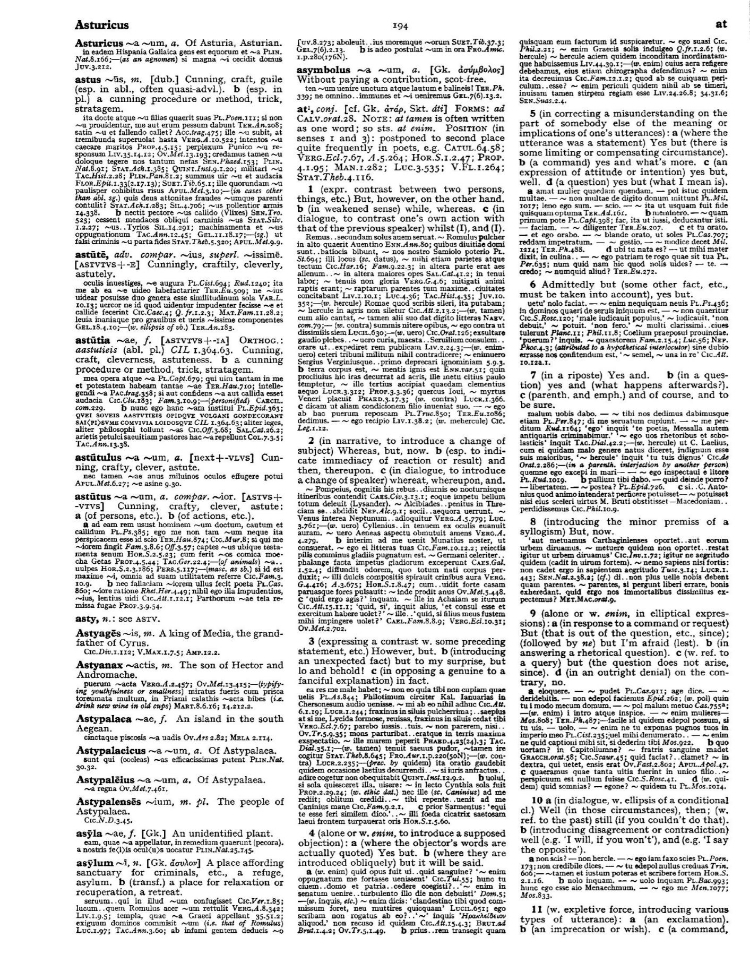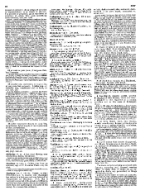
page_listing.tpl
page_subListingDetails.tpl
sub_listingDetails_style1.tpl
sub_listingDetails.title.tpl
at but
at is a Latin Conjunction that primarily means but.
Definitions for at
Wheelock's Latin
Conjunction
- 1
but; but, mind you; but, you say
- 2
a more emotional adversative than sed
Oxford Latin Dictionary
Conjunction
- 1
(expr. contrast between two persons, things, etc.) But, however, on the other hand. (b) (in weakened sense) while, whereas. (c) (in dialogue, to contrast one's own action with that of the previous speaker) whilst (I) and (I).
- 2
(in narrative, to introduce a change of subject) Whereas, but, now. (b) (esp. to indicate immediacy of reaction or result) and then, thereupon. (c) (in dialogue, to introduce a change of speaker) whereat, whereupon, and.
- 3
(expressing a contrast w. some preceding statement, etc.) However, but. (b) (introducing an unexpected fact) but to my surprise, but lo and behold! (c) (in opposing a genuine to a fanciful explanation) in fact.
Sentences with at
Latin to English
Cōnsiliīs istīus tyrannī quī trāns mare vīvit terrēmur, sed lībertātem amāmus at bellum magnā cum virtūte gerēmus.Compare We are terrified by the plans of that tyrant who lives across the sea; but we love liberty, and we shall wage war with great courage.
At perīculum quod vōs terret ā cīvibus fortibus victum est.Compare But the danger which terrifies you has been conquered by brave citizens.
At tyrannō expulsō, alius tyrannus imperium saepe accipit.Compare But after a tyrant has been expelled, another tyrant often gets the power.
At nemō erat quī istum hominem turpem dēfenderet.Compare But there was no one who would defend that base fellow.
Tyrannus imperat ut pecūnia fīat; et pecūnia fit. At ille stultus nōn sentit hanc pecūniam sine bonā fidē futūram esse nihil.Compare A tyrant commands that money be made; and money is made. But that fool does not perceive that this money will be nothing without good faith.
At multae mentēs ita ācrēs sunt ut bene discere possint. Compare But many minds are so keen that they can learn well.
Data sources
Notes
- Definitions
- Frederick M. Wheelock, Wheelock's Latin, 6th ed., rev. Richard A. LaFleur (New York, NY: HarperCollins Publishers, 2005): 126.
- P. G. W. Glare, Oxford Latin Dictionary, Vols. 1-8 (Oxford: Clarendon Press, 1982): 194.
- Word frequencies
- Christopher Francese, "Latin Core Vocabulary," Dickinson College Commentaries, last modified 2014, http://dcc.dickinson.edu.
- Paul B. Diederich, The Frequency of Latin Words and Their Endings, PhD diss., (Columbia University, 1939).
- Louis Delatte, Suzanne Govaerts, Joseph Denooz, and Etienne Evrard, Dictionnaire fréquentiel et index inverse de la langue latine [Frequency Dictionary and Inverse Index of the Latin Language] (Liège, Belgium: Laboratoire d'analyse statistique des langues anciennes de l'Université de Liège [L.A.S.L.A.], 1981): 119.
Bibliography
Allen, Joseph H. Allen and Greenough's New Latin Grammar for Schools and Colleges: Founded on Comparative Grammar. Edited by James B. Greenough, George L. Kittredge, Albert A. Howard, and Benjamin L. D'Ooge. Boston, MA: Ginn & Company, 1903.
Crystal, David. A Dictionary of Linguistics and Phonetics. 6th ed. Oxford, UK: Blackwell Publishing, 2008.
Delatte, Louis, Suzanne Govaerts, Joseph Denooz, and Etienne Evrard. Dictionnaire fréquentiel et index inverse de la langue latine [Frequency Dictionary and Inverse Index of the Latin Language]. Liège, Belgium: Laboratoire d'analyse statistique des langues anciennes de l'Université de Liège (L.A.S.L.A.), 1981.
Diederich, Paul B. The Frequency of Latin Words and Their Endings. PhD diss., Columbia University, 1939.
Francese, Christopher. "Latin Core Vocabulary." Dickinson College Commentaries. Last modified 2014. http://dcc.dickinson.edu/latin-vocabulary-list.
Gildersleeve, Basil L., and Gonzales Lodge. Gildersleeve's Latin Grammar: Third Edition, Revised, and Enlarged. 3rd ed. London, England: Macmillan and Co., 1903.
Glare, Peter G.W. Oxford Latin Dictionary. Vols. 1-8. Oxford, England: Clarendon Press, 1982.
Krüger, Bernd. "Latin Conjugation Tables." Cactus2000. Accessed May 5, 2023. https://latin.cactus2000.de/index.en.php.
Pierson, Nick. "Sound of Text." Accessed October 26, 2019. https://soundoftext.com.
Wheelock, Frederick M. Wheelock's Latin. 6th ed. Revised by Richard A. LaFleur. New York, NY: HarperCollins Publishers, 2005.
Wiktionary Contributors. "Victionarium." Wikimedia Foundation, Inc. Updated March 18, 2019. https://la.wiktionary.org/wiki/Victionarium:Pagina_prima.
Citation
Chicago (17th ed.)
Allo Contributors. "at (conj.) - Latin Word Definition." Allo Latin Dictionary. Last modified . Accessed February 16, 2026. http://ancientlanguages.org/latin/dictionary/at.
Entry created on . Last updated on .








